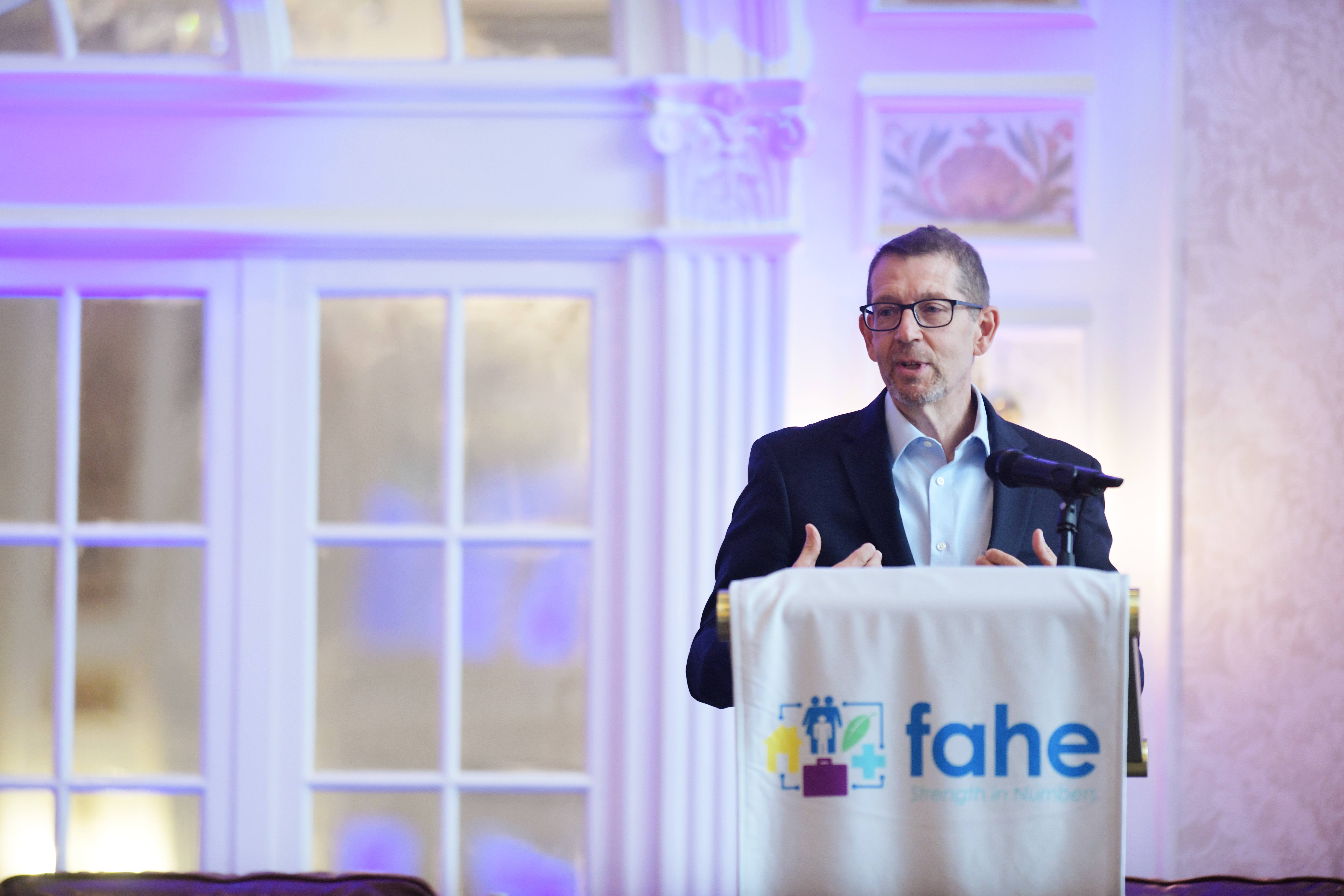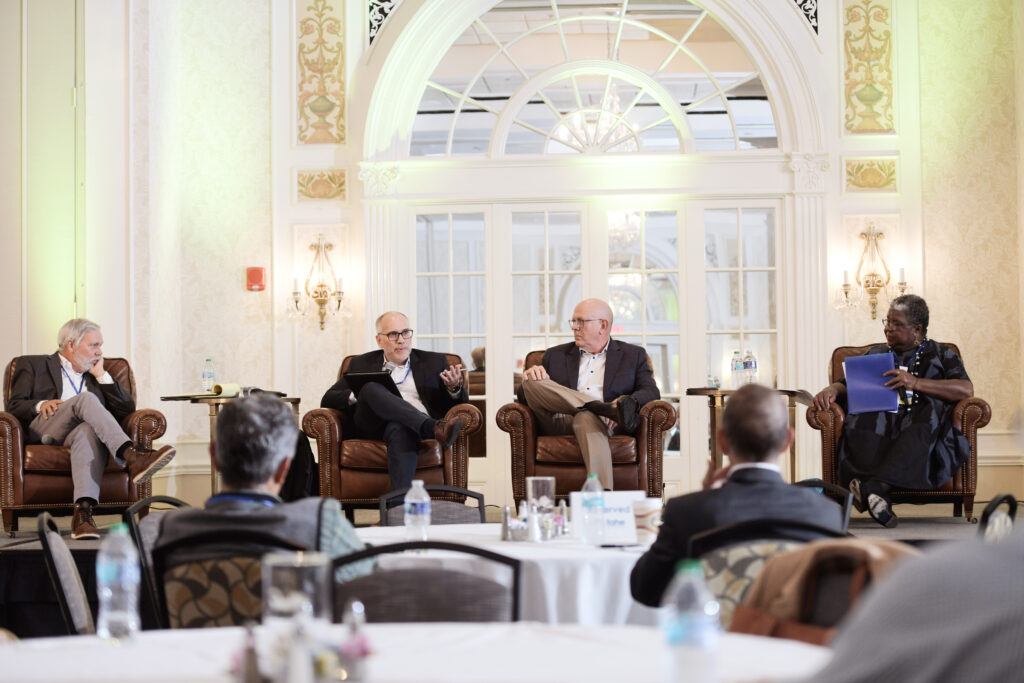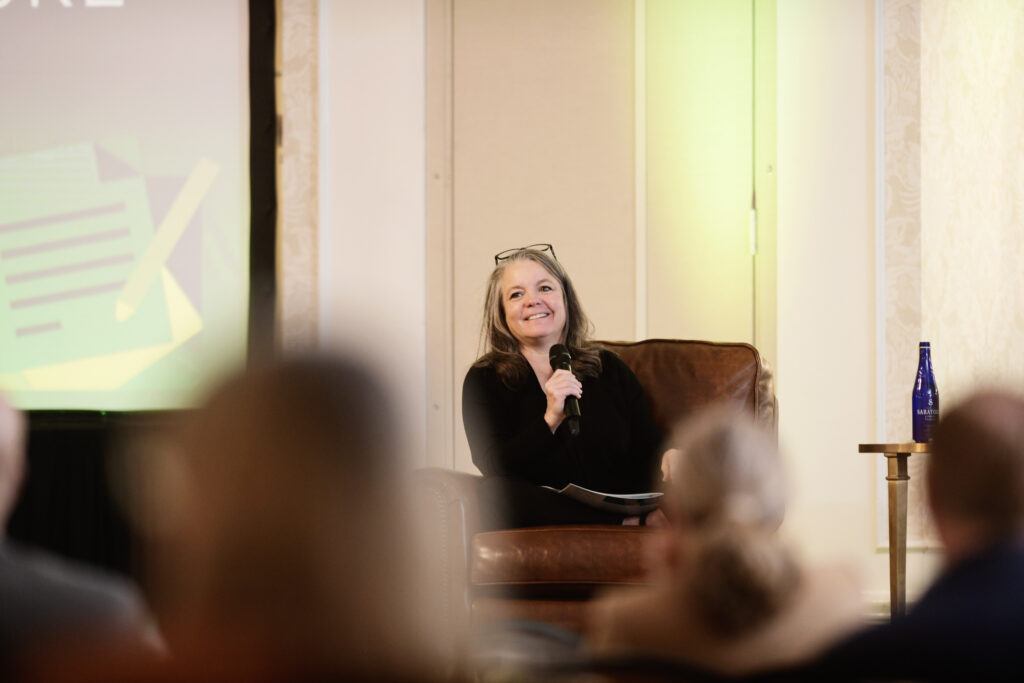
Fahe’s 44th Annual Meeting Recap
From September 9 through 11 Fahe Members and Friends gathered for an inspiring program of plenaries, breakout sessions, conversations, and convening at our 2024 Annual Meeting in Roanoke, VA, themed Building Our Future.

See the Facebook album with photos that highlight key moments!
Throughout the event we focused on the housing crisis in Appalachia and what we can do to build thriving Appalachian communities.
Day One: Monday, September 9
During the Annual Member Meeting Fahe Members heard updates from Caucus leaders representing Alabama, Kentucky, Tennessee, Virginia, and West Virginia/Maryland. Fahe’s President Sara Morgan and Fahe’s CEO Jim King provided positive reports on our overall progress. Other topics included an advocacy update and Member services updates.
On Monday evening, during dinner, we were treated to a keynote speech from Terrance Jackson, Director of Outreach for Barter Theatre. The theatre has been putting on shows since 1930 in Abingdon, VA. In addition to a robust show schedule the resident repertory company hosts “Black Stories, Black Voices” to showcase the richness of Black experiences in Appalachia. It also offers “Barter Connects,” a post-show discussion series that invites the community to consider themes from a play, such as abuse, with the help of a nonprofit organization focused on that theme.
Day Two: Tuesday, September 10
On Tuesday, Fahe’s board chair Jackie Mayo, of HomeSource east tennessee, kicked off the day. Then, Hope Cupit, of SERCAP, welcomed us to her home state. In addition to her warm words that morning, Cupit informed us that her organization would be offering bottles of cold beer from a local microbrewery that they had assisted with their small business lending, for anyone of legal age to sample later that evening.
In the opening plenary, Jim King was interviewed by Trey Kay, of West Virginia Public Broadcasting. The topic was how Fahe is rising to meet the housing crisis. Trey taped the discussion on stage to potentially be used for a future podcast on Us & Them. Jim made it clear that Fahe was rising to the challenge by “focusing on increasing housing production, linking to the secondary market, upping subsidy, advocacy, making programs work better, and bringing more money into the region.”
Dr. Basil Gooden, USDA, spoke next. He revealed how his dad advised him “don’t come back to the country after college because there are no jobs in the country.” Gooden continued, “every day I go to work in Rural Development I think about how I can change that narrative and encourage people to come back to the country.” He said it takes partners like Fahe to accomplish this. And he underscored that “the number one issue I hear about in rural America is the need for affordable housing.”
Next, a panel discussion on housing data featured Lance George, HAC, Mel Jones, Virginia Tech Center for Housing Research, Adrienne Smith, OFN, and was moderated by Trey Kay, West Virginia Public Broadcasting.
“By far, housing affordability is the greatest challenge in rural America,” said George. “There are multifaceted causes starting in the 1970s, then the housing crisis in 2008, and an acceleration of issues since the pandemic.”
Smith agreed saying, “Housing affordability cannot be ignored, especially at the low- and moderate-income levels. We must double down on this problem.”
Jones added, “The supply side problem is bigger than the demand side problem, driving up the cost of housing. And, home ownership is affected by rental affordability. You can’t save to build credit or save a down payment if your rent is too high.” In essence, lack of housing prevents mobility. And Insurance is becoming an additional area of concern.
The next plenary was a spotlight on local leadership offering innovative housing solutions from diverse organizations. Presenters included Tom Manning-Beavin of Frontier Housing; Nick Mitchell-Bennet, cdcb; Jake Powell, Community Housing Partners; and Sherry Trent, Eastern Eight.
Trent described how Eastern Eight is looking at new construction models, including townhouses for ownership on smaller lots to meet the market demand, a barndominium steel structure, as well as infill duplexes. Sherry stated “Eastern 8 is trying several approaches to see where we can increase production to having housing more available.” Powell took this up a notch and shared how Community Housing Partners is using modular construction techniques that can result in their ability to start a foundation and get a house to 80% complete in under one week! Then Manning-Beavin and Mitchell-Bennet ramped it up further by talking about how Frontier Housing is franchising cdcb’s DreamBuild bringing modular construction company to Frontier so they can control the production of modular units and de-silo the housing industry by combining the production, development, lending together. DreamBuild also allows the homebuyer a choice in what they buy.

The final plenary that day was Capital Ideas and Opportunities, moderated by Donna Gambrell, Appalachian Community Capital (and Fahe Board Member). Panelists included Patrick Kelley, Housing Partnership Network; Jim Peffley, NeighborWorks Capital; and Dave Clark, Woodlands Development & Lending.
Gambrell prompted each panelist to share what is new and what has changed in the capital landscape.
“Use your strength in numbers to collectively communicate your value. We need to create leverage with the capital marketplace, which is built on scale, and where scale means leverage,” said Peffley.
“80% of existing buildings will still be here in 2050. These buildings can be cleaner and greener. While there are still unknowns in the Greenhouse Gas Reduction Fund we can be looking at readiness,” said Kelley.
“There are a lot of details to think through with the Green Bank and Clean Communities Investment Accelerator awards such as energy efficiency upgrades, solar retrofits, and net zero buildings. Throughout there is a heavy emphasis on community engagements. In fact, it is essential,” said Clark.

Day Three: Wednesday, September 11
In the Road Ahead plenary session, Sara Morgan, Fahe posed questions about what the future holds to David Lipsetz, Housing Assistance Council; Jim King, Fahe; and Ralph Perrey, Tennessee Housing Development Agency.
The wide-ranging conversation covered many aspects of our work.
“We gotta build more stuff,” said Perry. “Since the housing crash, we haven’t built enough. We don’t build smaller homes anymore. We’ve got to get the talk right regarding affordable housing. It is best broached at the local level.”
“Our heart and soul sits in two places—it’s capital and capacity,” said Lipsetz.
“The GGRF is a once in a lifetime program. How do we leverage that so it will sustain us for a while? What we have to have is consistent and predictable dollars,” said King.
King added, “We are seeing a hollowing out of middle America. It’s not all low-income families that are on the outside looking in. A cherished belief about our mission—that we serve low-income families only—may be getting in our way.”
In our penultimate plenary, everyone in the ballroom split into four groups to explore strategies for generating greater network impact. Network Members and staff generated ideas, challenges and opportunities related to the monetization of existing activities (e.g., Solar Ready!), how to align strategies across the network to make the work easier (e.g., shared learning), market gap opportunities that Members could exploit (e.g., insurance) and finally out of the box ideas that would help Members and the Network do more good.
In his closing remarks Jim King reminded us of our challenge. Fahe is committed to doubling our financial impact and housing production by overall increasing total investment to $3 billion, growing housing production to 60,000 units, and reaching one million people across all programs and services between now and 2030.
Fahe Members and Friends in the room acknowledged the challenge with enthusiasm.
Next steps on the challenge are coming soon. King assured the gathering that Fahe will have a relentless focus on increasing housing production. He also alerted Members that we will host a check-in on the challenge with the Membership within just a few weeks.Fahe staff members Vonda Poynter and Jackie Weiss closed out the Annual Meeting by reminding everyone that next year marks Fahe’s 45th anniversary. The Fahe 2025 Annual Meeting will be held in Knoxville, TN. Stay tuned for dates and details to be announced.
